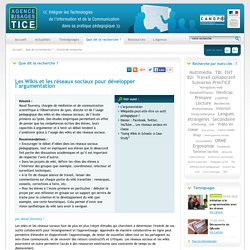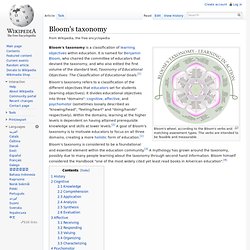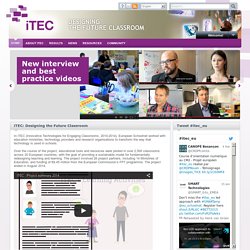

L'Agence nationale des Usages des TICE - Les Wikis et les réseaux sociaux pour développer l’argumentation. Par Maud Tournery * Les wikis et les réseaux sociaux font de plus en plus l'objet d'études qui cherchent à déterminer l'intérêt de ces outils collaboratifs pour l'enseignement et l'apprentissage.

Apprendre de manière collaborative en ligne peut permettre d'étendre et d'approfondir l'apprentissage, de tester de nouvelles idées tout en les partageant au sein d'une communauté, et de recevoir des retours constructifs et critiques. Les réseaux sociaux et les wikis pourraient en outre permettre l'accès à des ressources extérieures sans contrainte de temps ou de déplacement.
Taxonomie de Bloom. Droit d'auteur et ressources pédagogiques.
Khan Academy. Resources. TIC'Édu premier degré. Ed Tech Resources. Inset is dead! Long live Inset! Inset days are often criticised, with both teachers and parents finding them an annoyance.

Jane Basnett, Downe House’s head of Modern Foreign Languages, tells us why Inset days need to be remoulded into something worthwhile. September: So, the lovely, long, hot summer is over. Well, maybe not so hot, but lovely and long anyway. You have rested, recuperated and regrouped. You have done lots of reading for pleasure and reading for work and, if you are lucky, the two will have coincided. You know the thing. Then, just when you think it's all over, and mentally you have got your lips on a nice cup of coffee, some wag in the audience decides to prolong the agony and asks a question that really did not need asking. If you are lucky, the talk has been about some methodology or new teaching idea that really interests you and you can see how it is relevant to you and what you are trying to achieve in your lessons.
I think these types of Inset are something to which we can all relate. CintaNotes - Note Taking Software. Internet Security and Content Filtering Solutions. Bloom's Digital - Web 2.0. Best content in ICT in Primary Education. How Youth Learn: Ned's GR8 8. European Schoolnet. Bloom's taxonomy. Bloom's wheel, according to the Bloom's verbs and matching assessment types.

The verbs are intended to be feasible and measurable. Bloom's taxonomy is a classification of learning objectives within education. It is named for Benjamin Bloom, who chaired the committee of educators that devised the taxonomy, and who also edited the first volume of the standard text, Taxonomy of Educational Objectives: The Classification of Educational Goals. Bloom's taxonomy refers to a classification of the different objectives that educators set for students (learning objectives). It divides educational objectives into three "domains": cognitive, affective, and psychomotor (sometimes loosely described as "knowing/head", "feeling/heart" and "doing/hands" respectively). Bloom's taxonomy is considered to be a foundational and essential element within the education community.
History[edit] The first volume of the taxonomy, "Handbook I: Cognitive" (Bloom et al. 1956) was published in 1956. Cognitive[edit] Guildresearch_blooms2013 (1).pdf. Microsoft Educator Network - For educators : Overview. Connect and interact Connect with educators around the world.

Share learning activities and tutorials and join the conversation in educator discussions led by educators. Learn and grow No matter where you are in your learning journey, Microsoft Educator Network is here to help with practical, interactive, and flexible professional development that works with your busy schedule. Apply and innovate Innovative teaching does not rest with a single device, rather with the educator. Specialized training programs for every level of expertise Digital Literacy Whether you are new to computing or have some experience, this curriculum will help you develop a fundamental understanding of computers and productivity software. Ready to get started? Teaching with Technology Move beyond learning simple technology tools and develop a deeper understanding of how technology integration can enhance the teaching and learning experience, enable 21st century skill acquisition in students, and save you time.
Get started. Teach Program Worldwide. Shout. Home. In iTEC (Innovative Technologies for Engaging Classrooms, 2010-2014), European Schoolnet worked with education ministries, technology providers and research organisations to transform the way that technology is used in schools.

Over the course of the project, educational tools and resources were piloted in over 2,500 classrooms across 20 European countries, with the goal of providing a sustainable model for fundamentally redesigning teaching and learning. The project involved 26 project partners, including 14 Ministries of Education, and funding of €9.45 million from the European Commission’s FP7 programme. The project ended in August 2014. Read more: Project summary | Evaluation results.